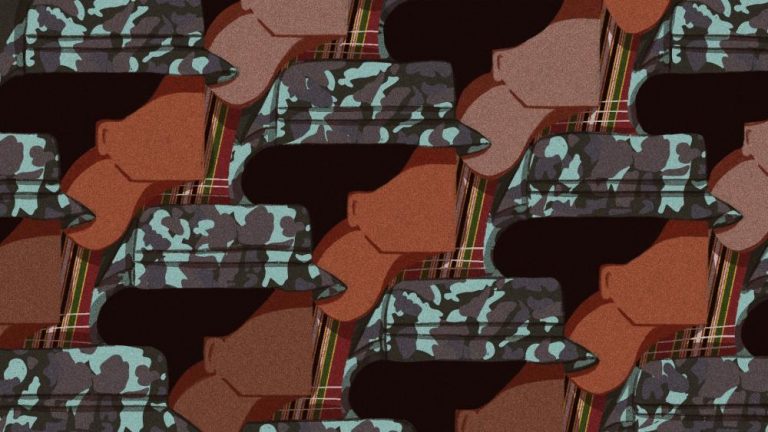
[This week, Myanmar’s military junta launched two consecutive days of airstrikes on the headquarters of the Chin National Front, an ethnic resistance organization that has also joined the countrywide revolution against the February 2021 military coup. The airstrikes – part of the military’s broader attempts to destroy and punish armed resistance to its power – killed five members of the CNF’s armed wing, including two women. In September, reporter Emily Fishbein spent time at the CNF headquarters, known as Camp Victoria, and other resistance camps in the country’s northwestern Chin State, where she spoke with women about why they joined the anti-junta resistance, and what challenges they face]
Emily Fishbein
ON THE MYANMAR-INDIA BORDER
As the morning fog lifted from Camp Victoria, a resistance camp in the mountains of northwestern Myanmar, a battalion of tailors set to work. Women in fatigues drew chalk lines on camouflage cloth and pressed coal-heated irons over newly stitched trousers; others pedaled their treadles, the hum of sewing machines spilling from the open windows of their compound.
These workers make up the uniform battalion of the Chin National Front, which is fighting for an autonomous land for Chin people within a federal democratic union. It is also participating in Myanmar’s broader resistance to the military junta. All but two of the battalion’s 20 members are women, and it is one of many battalions in the CNF and other armed resistance groups across Myanmar with a significant female presence.
When the military seized power in February 2021, overthrowing the democratically elected civilian government and arresting its leaders, women were at the forefront of the anti-junta resistance. Women led some of the country’s first non-violent protests, and continue to demonstrate despite grave risks to their lives, while female civil servants were also leaders of a countrywide civil disobedience movement that saw hundreds of thousands of workers go on strike, many of whom still refuse to return to their posts.
Women-focused civil society organizations have also been on the front lines of the humanitarian response to a crisis that has resulted in the forced displacement of more than one million people, while exacerbating poverty and food insecurity. It has also, according to UN Women, heightened females’ vulnerability to conflict-related sexual violence, early and forced marriages, human trafficking, sexual exploitation, and irregular labor migration.
In the nearly two years since the coup, more than 16,500 people have been arrested (a fifth of them women) and more than 2,600 killed. However, the military’s efforts to silence dissent have backfired, causing armed resistance to erupt across the country.
While most of those enlisting are men, women have also joined in large numbers, and even formed a women-only resistance group in the country’s central Sagaing region.
Women’s participation in armed resistance in Myanmar is not new: In the country’s borderlands, where more than a dozen ethnic armed organizations are fighting for autonomy, women have been actively involved for decades.
But while Myanmar’s anti-coup movement has upended traditional social norms and brought significant advancement for marginalized groups, including women, the armed resistance remains largely gendered, with few women serving on the front lines or in decision-making roles. A recent report by the United States Institute for Peace also found that women were under-represented in leadership positions within resistance-linked community policing groups, and that women were rarely given the chance to participate in patrols or arrests.
The New Humanitarian spoke with six women serving in the Chin National Front or in the allied Chin resistance groups established since the coup. All but one of the featured women have requested to be identified by their preferred nicknames to minimize the risk of retaliation against their family members. Their stories have been edited for length and clarity.
“For women to be participating in the revolution is a strength” – Mai Rai Boel
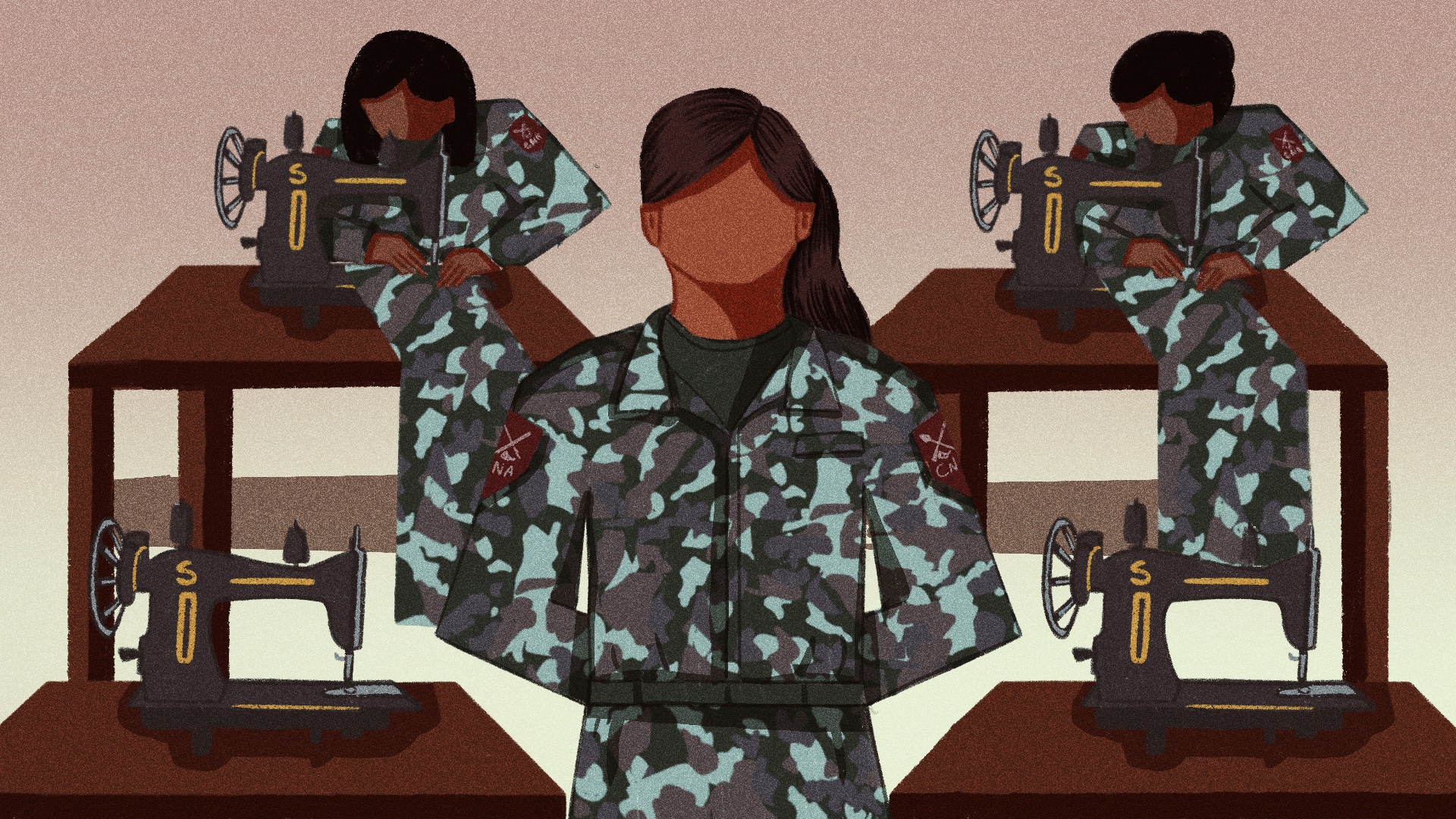
Mai Rai Boel, from the city of Pakokku in Myanmar’s central Magway region, had worked with a civil society organization in Yangon focused on women’s empowerment since graduating university in 2019. Now she serves as the commander of the CNF’s uniform battalion. In her free time, she runs gender awareness training for other women in her camp.
After the coup, I joined the protests in Yangon with my friends. But by last April I could see that things weren’t going like in the movies and, eventually, I would have to go into the forest. My parents didn’t want me to get involved in this revolution. Because I am a woman, they just wanted me to study. So I came to this camp without their knowledge. Even now, they don’t support my decision. They always tell me to come back home. But I am following my own beliefs, so I hope that one day they will understand.
I came to this camp with one friend, but she went home after attending training for the Chin Reserves. I had planned to go back too, but I changed my mind after the training. I served in the CNF’s war strategies department, and then I attended combat training, where I was the only woman among 34 men.
Even for women to be participating in this revolution is a strength. If many women participate, we can share our knowledge with each other, and our difficulties will gradually decrease. Our voices will be louder, and men will have to listen.
“I want us to be able to participate more in leadership roles and to have more strength to resist oppression.”
My passion is for women’s rights, particularly the intersectionality of gender and other issues like ethnicity and educational background. Even within my Chin ethnic group, there are many inequities. But we are all human, and we all deserve to achieve our rights.
Things have really improved for women in Myanmar since the political opening started in 2010. The space for media opened a lot, and we could use Facebook and the internet. We saw that women’s rights in other countries were very advanced, but in our country many women were just cooking rice and curry and didn’t have much confidence. Women’s organizations and women’s rights activists emerged and did what they could. Things have really improved from my mother’s and grandmother’s era, but improvements take time, generation by generation.
Today in Myanmar, men still only give women supporting roles. I want us to be able to participate more in leadership roles and to have more strength to resist oppression. It is easy to say, but it isn’t easy to achieve. Women face many invisible difficulties – a glass ceiling. I really want to break it.
“I came here ready to give my life to this revolution” – Nu Dawt
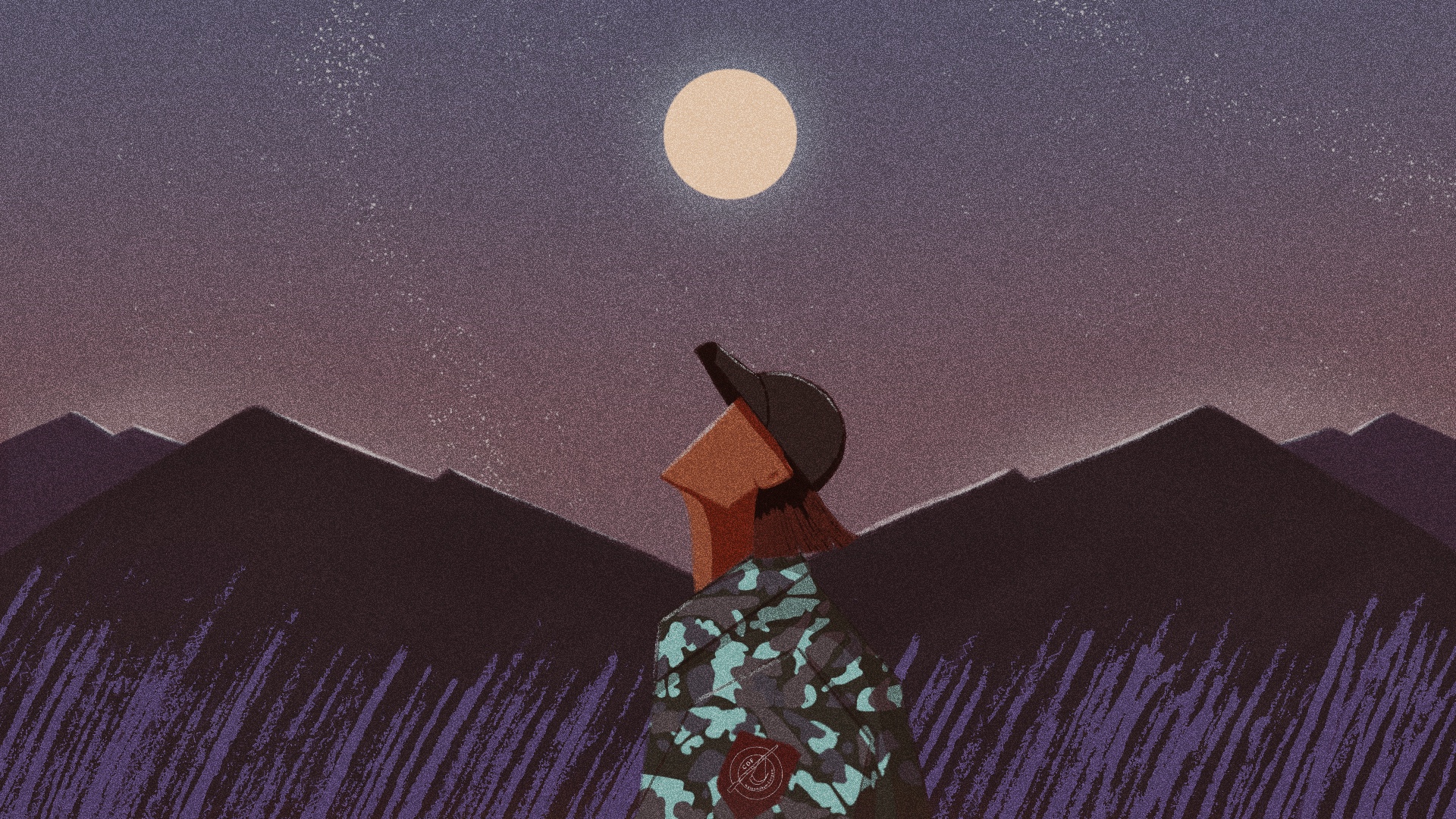
Nu Dawt was waiting to return to Bangalore, India for the second year of her Masters of Divinity program when the coup happened. She protested in her native town of Kalay, in Sagaing region near the Chin State border, and last April joined the Chinland Defense Forces (CDF).
I never imagined I would live in the forest or take up arms. Before, I planned a lot for when I finished school, but now I have to think about things like what I will eat tomorrow. I always ask myself why I am doing this and whether it is the only way. I think about all of the people back home who love me, and how I can’t do anything for them while I’m here in the forest. I know nothing about household chores. I haven’t even been able to finish school, and the things that I learned in school aren’t useful at all anymore. But nobody forced me to go this way; I am doing this of my own will. I can get through this.
In my branch of the CDF, there are more than 40 women across six battalions. Many of us didn’t know each other before; we only came to know each other when we all went into the forest and started living together like a family. Now, we talk openly among ourselves. But there are many issues and needs that we are too shy to talk about with our male comrades.
Men and women all received the same training; there was no such thing like women train this way and men train that way. So far, there aren’t enough guns for women who want to fight. But when there are enough guns for everyone to hold one, we will never hear again that women can’t hold guns. I’m not saying we aren’t scared of giving our lives, but we will go the same way as our male comrades.
“Women endured difficulties that we never imagined, and men understand that.”
Things changed a lot since the coup regarding gender norms. Before, there were many things that women weren’t allowed to do, and opportunities that women didn’t have. Now, people have become more open-minded. In this revolution, both men and women are living in the forest and eating the same food. Women endured difficulties that we never imagined, and men understand that. They see how much women can do.
Some men still say, ‘Oh, women aren’t useful! They need so many items! And what will they do?’ But there are many things that women do very well. For example, instead of commanding our comrades, we give orders like ‘Can you help with this and that?’ and our comrades accept it. Women have many benefits to the revolution, and although we have different roles, we all contribute equally.
When I consider what I am most proud of, it is that I came here ready to give my life to this revolution, for my country and for my people. My name will remain after I die for the sacrifices I have made.
“I never thought I would be so involved in politics” – Esther

A first-year physics student before the pandemic, Esther was helping her parents on their yam farm in her village in Kanpetlet, a remote township of Chin State, when the coup happened. Now, she is serving as a transcriptionist at the CNF headquarters.
When I was in my village, I mostly stayed at home. My family has no motorbike and, as a woman, it’s hard to go out alone. There’s no mobile phone service in my village either, so I didn’t learn anything and it was really boring. But when people were injured in battle or from landmines, I visited them and cared for them. And when they were sorrowful, they opened up to me. They told me what it was like in the forest and told me not to go. I listened to them, and I thought about what it would be like if I were in their place.
At first, I worried because I never thought I would be involved in politics. But this July, I joined the CNF. I am alright here because I have work to do, and I have mobile phone service and a place to stay. But my parents asked me to come home. Their health isn’t good, and they also worry about me.
When I arrived here, I heard some men ask, ‘Why are women coming here? Women can’t do anything.’ But there are also some people who look up to women, who say, ‘Women are so smart! They can cook in the forest,’ and who even say that some women can do more than men. I really welcome it. Now, many people are participating in this revolution in every way they can. If everyone is involved in the revolution, our country will improve and develop.
“We are transforming the whole system” – Mai Mai
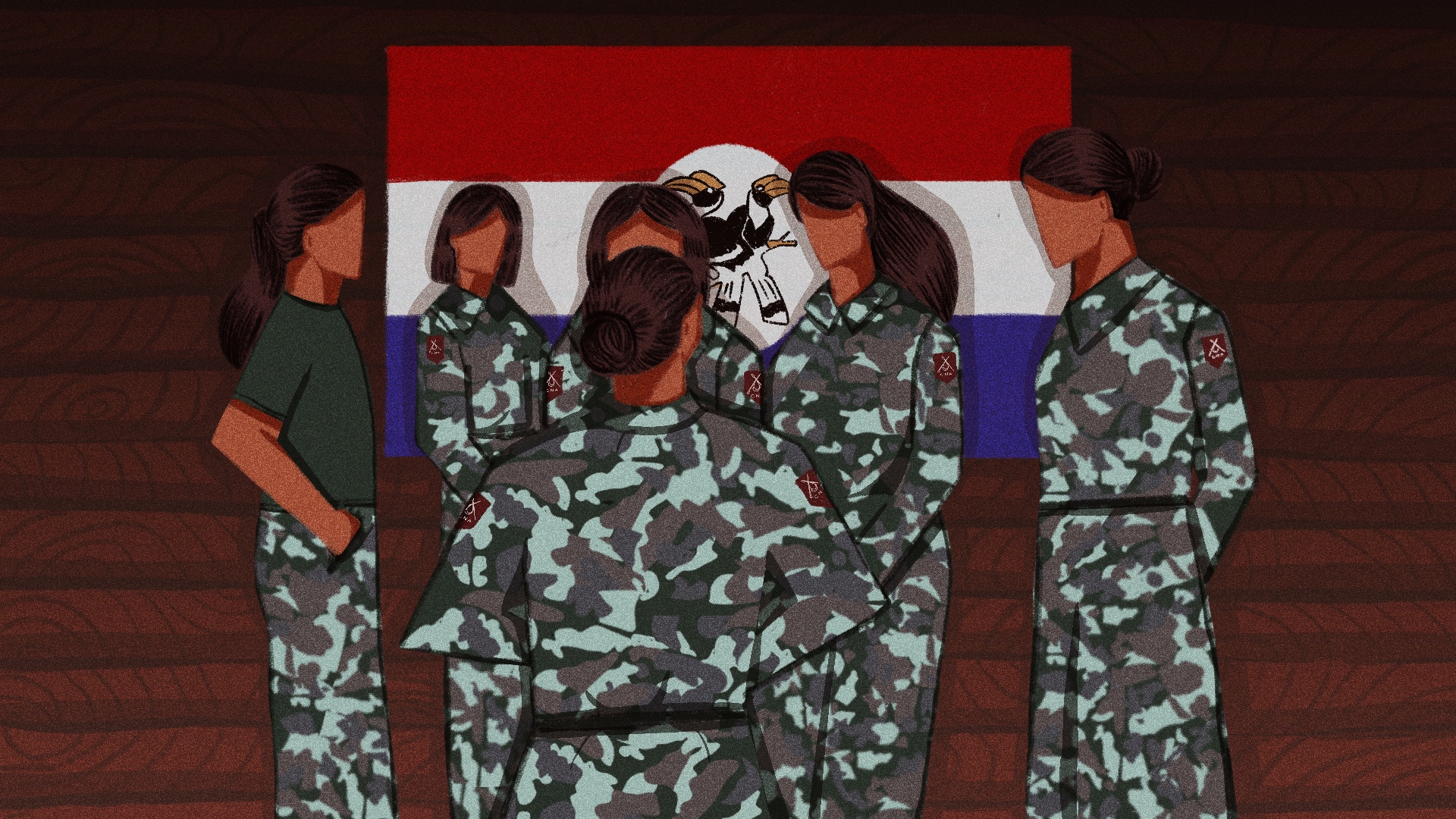
Mai Mai, from Rakhine State’s Ann Township has been active in community work related to women’s issues since she was a university student. In the years leading up to the coup, she provided humanitarian support to conflict-displaced women in her township. She now serves as human resources coordinator for the CNF’s Department of Military Strategic Research and Development. She is also a co-organizer of monthly discussion circles for women in her camp.
I led some of the first protests in my town, and in March of 2021 the military charged me with incitement. I moved from place to place for the next four months, and although I still did some fundraising for the civil disobedience movement, I wasn’t satisfied with myself. I wanted to do more, so I joined the CNF last July.
In this revolution, the things that women and men do are a little different. Some women want to go to the front line, but for the time-being we aren’t allowed. We are supporting as much as we can from behind. Every person has their strengths and weaknesses, but as a woman, and especially as a young woman, sometimes men don’t fully listen to me. I have to try a lot harder than men.
“I want people across Myanmar to leave ideas of male dominance behind. I want women to know that we can do it.”
Gender awareness is still relatively new in my country, and this awareness is mainly on paper but weak in practice. Many people still think that women who can’t cook or do household work will never have a husband. But whether we can do those things is irrelevant. I want to get rid of this kind of stereotyping. Women really need to be accepted at the front, and to be included alongside men.
We aren’t only fighting an armed revolution; we are transforming the whole system. However much gender awareness we thought we had before, we all have a long way to go. The reason I became a women’s activist is that even we – women – don’t realize our own identities.
I want people across Myanmar to leave ideas of male dominance behind. I want women to know that we can do it. We can stand up and speak out, and we can lead. And I want men to know that there are very smart and talented women, and to truly give us a chance.
“I am trying to use the skills that I have to contribute to this revolution in every way that I can” – Anna
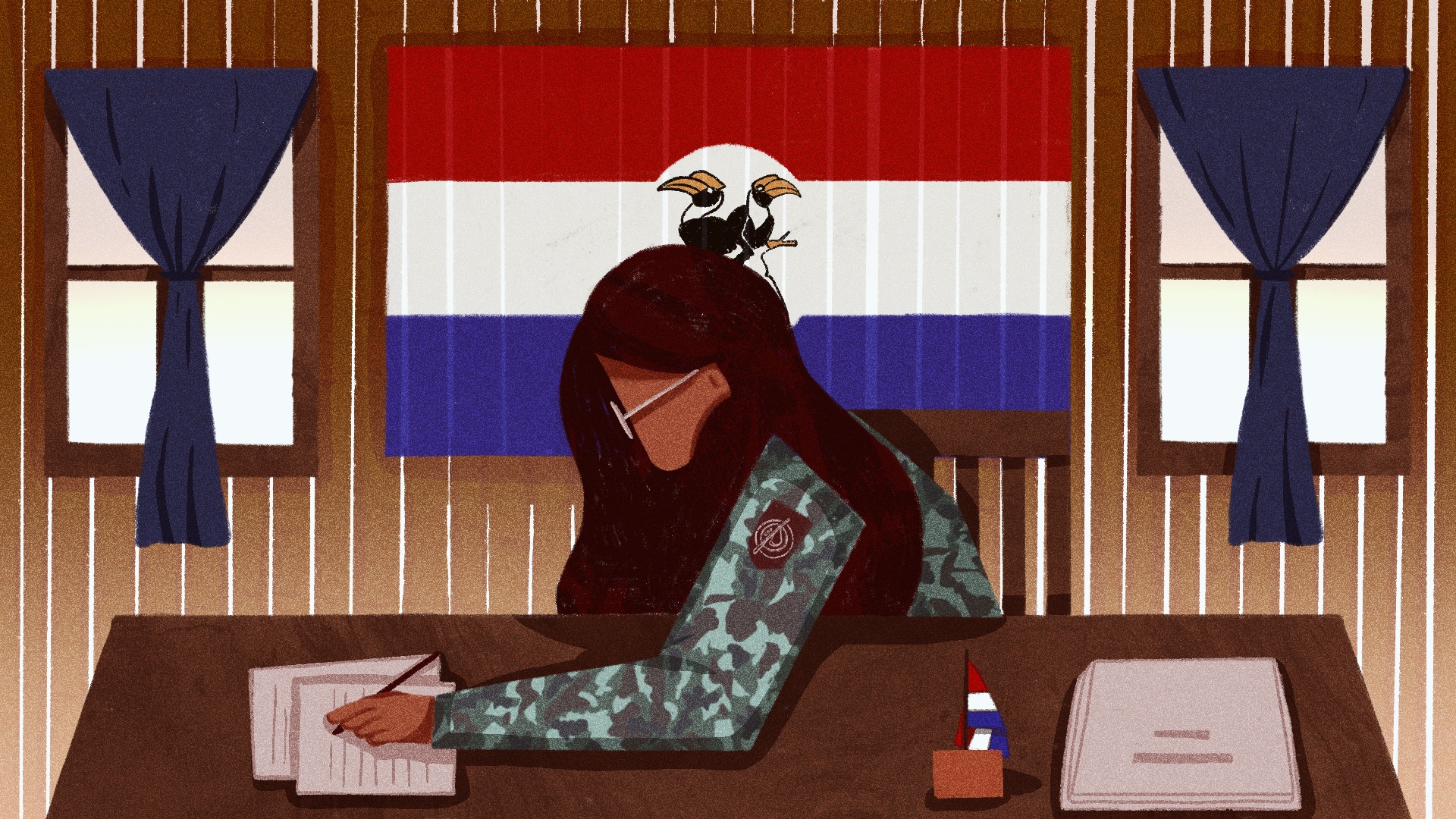
Anna was working from home in Thantlang in Chin State as a civil engineer with a Yangon-based company when the coup happened. Last September, the leaders of the CDF-Thantlang asked if she could join and contribute her computer skills. Now she serves in an administrative role at its headquarters.
Before I joined, I read the diary of a Chin revolutionary from the 1988 pro-democracy movement and carefully considered whether I could also endure such difficulties. I decided to come this way because I believe that now is the time to defeat and root out the enemy and to achieve self-determination for Chin people.
Sometimes I design barracks, and sometimes I use my typing skills or organize documents. I also plan everything in this camp, down to what we will eat each day and what kind of shampoo we will use. It’s a lot of work, but I do it enthusiastically because I know that I am useful.
Before the coup, I was really crazy about engineering, and I always prayed that with my education I could do something useful for my community. If this revolution ends soon, I want to return to engineering, but I don’t really hope for it anymore. Instead, I hope for the future of my country and Chin people. And I hope that females will have more opportunities in my society.
“Sometimes I design barracks, and sometimes I use my typing skills or organize documents. I also plan everything in this camp, down to what we will eat each day and what kind of shampoo we will use.”
Some women might think that they aren’t capable of taking part in this revolution, but that’s not true. We shouldn’t just rely on men; there’s a lot that women can do. For this horrific era to end more quickly, and so that we can reach a better future, everyone should participate – whether by taking up arms, going on strike from our jobs, or supporting from behind.
Sometimes I feel frustrated because I’m not fighting on the front lines alongside my male comrades, but when I feel that way I try to refocus on what I can do, and immerse myself in that. I’m trying to use the skills that I have to contribute to this revolution in every way that I can.
“It suddenly hit me that we are really at war” – Olivia Thawng Luai

Olivia Thawng Luai, from Falam in Chin State, served as assistant director of the Ministry of Health and Sports under the former civilian government, and is now Assistant General Secretary 2 of the Chin National Organization/Chin National Defense Force, an armed resistance group based in Falam Township. A former karate champion, she now uses these skills to train Chin resistance forces across the state.
I came back from Seoul with a Master’s in Sports Management in January 2021. The coup happened a week later, and I joined the civil disobedience movement. I also participated in anti-coup demonstrations and, on International Women’s Day, I gave a speech about women’s rights.
I joined the armed revolution in April 2021 and began preparing myself to train Chin resistance forces as well. In my training course, which lasts two months, I teach endurance so that my trainees can run up and down mountains; and karate skills, which can give them confidence if they need to engage in hand-to-hand combat. I also teach discipline and obedience. And for community police forces, I teach skills that can be useful when arresting people.
Sometimes, people don’t want to listen to me because I’m a woman. Others are impatient to pick up a gun and fight against the military. In those situations, I say, ‘I don’t want to argue, but I think that if you learn this, it will be better.’ After they see my training style, they usually come to listen.
I also take care of my comrades as much as I can, but I have faced many painful losses, including the lives of more than 20 young people who I trained. On 29 June 2021, military forces captured and killed four of them and buried them in a shallow grave. They also laid a landmine under the bodies, which detonated when my comrades tried to retrieve them, killing one more and injuring nine.
My comrades told me not to go to the scene of the incident – that it was too far up the mountain – and that, as a woman, I should stay behind. But it just made me even more determined. So we set off together, and when my comrades got tired I even climbed ahead.
When we arrived, it looked like a scene from a World War II movie. I felt a terrible pain in my heart, but I held back my tears and said, ‘Don’t lose your spirits! God is with us.’ Then, I ran to a place where I was alone and cried. Soon, one comrade came, hugged my shoulders, and cried with me. After a while, we dried our tears and went back to tend to the injured.
“I teach endurance so that my trainees can run up and down mountains; and karate skills, which can give them confidence if they need to engage in hand-to-hand combat.”
The faces of two of them were covered in shrapnel wounds and they needed urgent medical treatment, so three nurses and I decided to take them across the border to India. We had to drive our motorbikes through the forest, but we didn’t dare to turn on our lights for fear that villagers would mistake us for military soldiers. Still, when we reached the next village at 2:30am, the villagers fled. We broke into a schoolhouse and slept there; our comrades crying through the night.
We continued on the next morning and crossed the Tiau river into India. When I looked back at my country, it suddenly hit me that we were really at war.
I spent the next three months tending to my comrades. One lost both of his eyes, and the other was mostly blinded as well. Sometimes, I want to stop participating in this revolution. But when I think about my wounded comrades who continue fighting for their lives, it motivates me to continue.
I am participating in this revolution not only to defeat the military, but also to unite Chin people. Throughout history, the military has made us fight each other so that they can more easily rule us, and in Chin State we have many divisions from one township to another.
Women face particular challenges living in the forest. We have to manage our menstruation and find a place to bathe in privacy. But women have many strengths to contribute. We are patient, detail-oriented, and good at encouraging and motivating our comrades. Before they go to the front line, we make sure that they have eaten and packed everything they need, and that their gun straps aren’t digging into their shoulders. When they get injured, we tend to them.
I am so grateful to be serving in my current role. In the past, I represented the Myanmar flag when I competed in foreign countries for karate, and, by the grace of God, I succeeded. Now I am using my skills according to the needs of the revolution.
__________________
 Emily Fishbein is a freelance journalist covering human rights and social justice issues in Myanmar and among refugees in Malaysia
Emily Fishbein is a freelance journalist covering human rights and social justice issues in Myanmar and among refugees in Malaysia
JC, the artist name for an illustrator from Myanmar’s Karen nationality, created the illustrations in Caen, France.
Courtesy: The New Humanitarian (Posted on Jan 12, 2023)